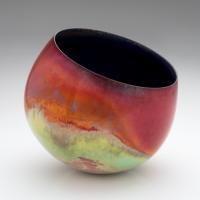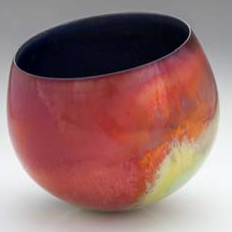
Workshops by Greg Daly
 Introduction:
Introduction:
Registering for the GIAN Course on Speciality Glazes and Colour Development The GIAN (Global Initiative of Academic Networks) Course is supported by the MHRD, Government of India. To register for this course you first need to register yourself at:
http://www.gian.iitkgp.ac.in/GREGN/index
by paying an one time fee of Rs.500/-
Following this you would need to register for the course at the following link:
http://www.cep.iitb.ac.in/calendar/2018.cgi#January
GIAN Course on Speciality Glazes and Colour Development Course to be conducted by Greg Daly and Sandeep Manchekar at IDC, IIT Bombay
Module A: 30 January -- 3 February, 2018: Glaze Theory and Colour Development
Module B: 4 February -- 5 February, 2018: Lustre Glazes:
Charges for the Course
Participants from abroad : US $500 (All modules)
Industry/ Research Organizations:
Module A: Rs. 20000/-
Module B: Rs. 10,000/-
Speciality Glazes and Development of ColourIntroduction: Students will learn the structure of glaze and the development of colour in a variety of glaze types and finishes. The development of the glaze and colour will be through various testing methodologies for example line blend, tri-axial blend, square blend & colour blends. The testing & development program will lead to the student developing their own palette of glazes. Occupational health and safety instruction is an integral part of this course.
Module A: Glaze Theory and Colour Development: 30 January -- 3 February, 2018
Module B: Lustre Glazes: 4 February -- 5 February, 2018
This course is organized in two modules that could be taken together or independently. The first module of 5 days on Glaze Theory and Colour Development would be conducted by Greg Daly and the second module of 2 days on Lustre Glazes would be conducted by Sandeep Manchekar.
The course would introduce students to the fundamentals of glaze chemistry. It would build an understanding of methodologies used to create glaze colour-palettes. A hands-on approach is followed for testing and developing glaze compositions. The course would help in developing procedures for line, bi-axial, tri-axial, square and colour blends. Students undertaking the course would be able to develop a confidence in glaze application, testing and analysis.
WHO MAY BENEFIT:
- An industrial designer working in glazes and ceramics.
- A studio potter working with glazed tableware.
- A ceramic artist or a sculptor interested in glaze applications and speciality glazes.
- A student or faculty from the ceramics / design department of an academic institution interested in glazes, colour development and speciality glazes.
Course Schedule
|
|
Lectures |
Studio-Practice / Tutorials |
|
Day 1 |
An Introduction to Glaze Chemistry
|
Make tests slabs. 8 Extrude test tiles. |
|
Day 2 |
The theoretical basis of glaze compositions
|
Test Random glazes. Materials used in random glazes. Rotation of materials in Random glaze. |
|
Day 3 |
Creating Line Blends and Triaxial Blends
|
Base glaze: line blend flux & silica |
|
Day 4 |
How different metal oxides impart colour • Colour response from metal oxides in different base glazes |
Discuss glazes and their compositions |
|
Day 5 |
Understanding the role of fluxing agents
|
Use coloured glaze results substitute Students to use their base glaze to Refine colour blends for out come of Test – changes to glazes. Grid test of glazes. Analysis of Results |
|
Day 6 |
Lustre Glazes Speciality glaze/s and colour surface. |
• Making of pots / tiles for application |
|
Day 7 |
Lustre Glazes
|
• Analysis of Results |
Academic Institutions:
Faculty from educational institutions): Rs. 10,000/- (All modules)
Students from educational institutions): Rs. 5,000/- (All modules)
The above fee includes all instructional materials, lunch and refreshments for five days.
Participants can send a demand draft payable to
"Registrar, IIT Bombay (CEP Account)" along with online Registered ID to this address:
Professor Raja Mohanty
IDC IIT Bombay, Powai
Mumbai- 400 076
Phone:022 2576 7825
OR
Participants may transfer through NEFT/RTGS the amount to IIT Bombay account and write to: gian2018gregdaly@gmail.com
the amount, the transaction ID, the bank branch name, your name and the date of transfer with online Registered ID. We will send a confirmation soon.
Name of the Payee : Registrar, IIT Bombay, CEP Account
Name of the Bank : State Bank of India
Banker's address : IIT Powai Branch, A.S. Marg, Powai, Mumbai-400 076, India.
Phone : +91-22-25728555
Bank A/c No. : 10725729128
Account Type : CURRENT
MICR Code : 400002034
IFSC / BIC Code : SBIN0001109
Do you need accommodation?
Limited accommodation is available at Powai, near IIT Bombay (Rs 1500 per day per person on twin sharing basis) on a first come first serve basis.
Cancellation Policy:
All cancellation should be made in writing and sent to:
Professor Raja Mohanty
IDC IIT Bombay, Powai
Mumbai- 400 076
Phone:022 2576 7825
Cancellation Request Refund Amount:
Before 30 days of Workshop 2018: 75%
Before 29 to 15 days of Workshop 2018: 50%
Within 14 days of Workshop 2018: No Refund